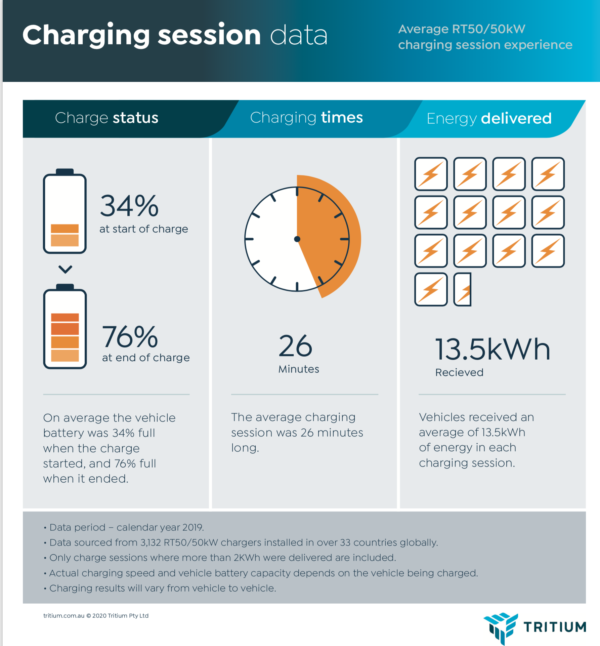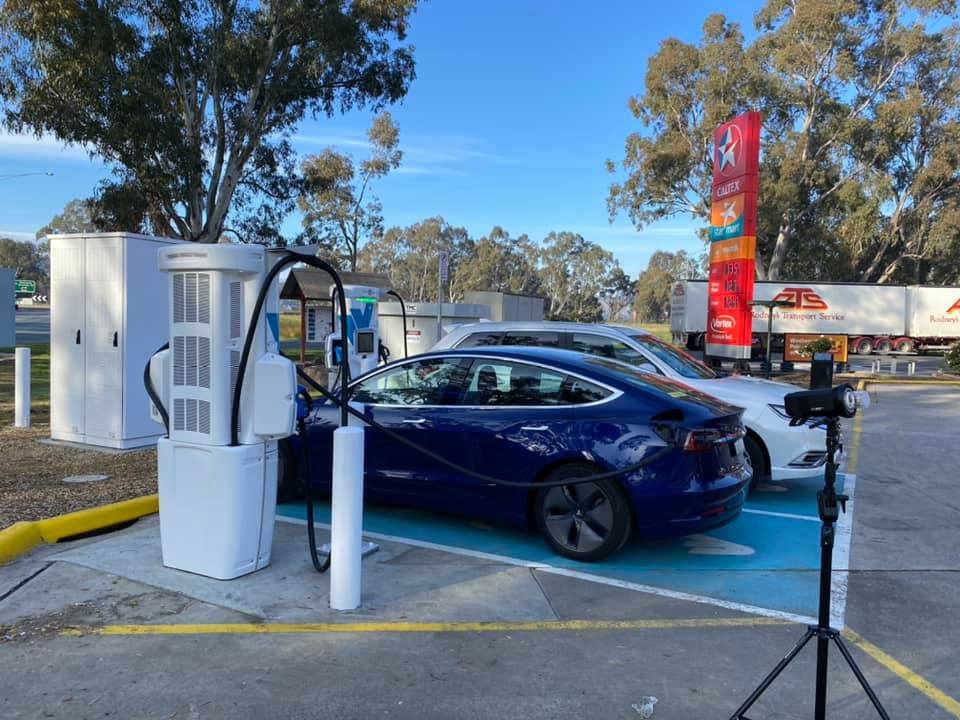Tritium, the innovative Brisbane-based global provider of electric vehicle (EV) DC fast-charging stations today released statistics gathered from more than 3,000 of its RT50/50kW DC Fast Chargers installed in some 33 countries.
They reveal a relaxed approach to recharging, with sessions averaging 26 minutes in length, not the 10 minutes it would typically take to add 50 kilometres of range with this charger capability.
The figures can’t be said to specifically reflect Australian EV-charging habits — since the local installed base of Tritium RT50/50kW DC Fast Chargers numbers a mere 103 (47 in New South Wales, 25 in Queensland, 18 in Victoria and the remainder sprinkled about).
But the Electric Vehicle Council of Australia statistics show that the average Australian drives 38 km a day and 80% of global EV owners tend to fully charge their batteries at home; with an average range of around 450 kilometres on a fully charged batteries of new EVs, there’s no need to panic…
…At least not until you’re driving out to the country on a long weekend, and you start hunting around for a top-up at one of the less than 2000 chargers (as counted by Infrastructure Australia in early 2019) in this wide brown land, some 250 of which are estimated to be of the fast-charging type.
Give us a lift?
Other key findings downloaded from Tritium infrastructure, which is concentrated in the United Kingdom, European countries and in the US, are that vehicle batteries had an average charge of 34% when they hooked up for a charge, and departed with 76% of their maximum capacity.

Image: Tritium
Tritium’s partnerships in markets such as the UK have been accelerated by those countries’ policies to reduce pollution from passenger vehicles. For example, the UK Government will ban sales on petrol, diesel and hybrid cars from 2035 — a deadline it brought forward at the beginning of this year from the original time frame of 2040, because it said it could not meet its as-close-as-possible to net-zero emissions by 2050 target without accelerating.
Globally, more than 14 countries have declared their intent to ban sales of fossil-fuel powered vehicles, with some, such as Norway committed to a 2025 cut-off point.
Policy and incentives could set Australia on the EV track
In Australia, a recent poll by The Australia Institute reported that 50% of Australians support all car sales nationally being electric by 2025.
However, the Federal Government’s latest emissions-related document, the Technology Investment Roadmap Discussion Paper made scant mention of EVs, referring to a “forthcoming National Electric Vehicle Strategy” — that awaited framework of mythical status, which may ultimately deliver little of substance given the Coalition’s criticism of Labor’s national EV target of half of new car sales by 2030.
According to the Quarterly Update of Australia’s National Greenhouse Gas Inventory: September 2019 Australia’s transport emissions have increased 64% since 1990, and now account for 18.9% of our total emissions burden.
Numerous polls suggest the Australian appetite for EVs is strong —the Climate council found 50% of Australians would consider buying an EV when prices are comparable to those of petrol-driven cars — battery prices are reducing, gradually lowering the cost of new EVs, and charging infrastructure is trickling out across the country.
Caltex/Ampol this month went live with the first of six petrol-station sites in NSW and Victoria, each of which will have two 350 kW Tritium chargers, where motorists might easily spend 26 minutes, supplementing their home charge, on the way to their next destination.
This content is protected by copyright and may not be reused. If you want to cooperate with us and would like to reuse some of our content, please contact: editors@pv-magazine.com.









By submitting this form you agree to pv magazine using your data for the purposes of publishing your comment.
Your personal data will only be disclosed or otherwise transmitted to third parties for the purposes of spam filtering or if this is necessary for technical maintenance of the website. Any other transfer to third parties will not take place unless this is justified on the basis of applicable data protection regulations or if pv magazine is legally obliged to do so.
You may revoke this consent at any time with effect for the future, in which case your personal data will be deleted immediately. Otherwise, your data will be deleted if pv magazine has processed your request or the purpose of data storage is fulfilled.
Further information on data privacy can be found in our Data Protection Policy.